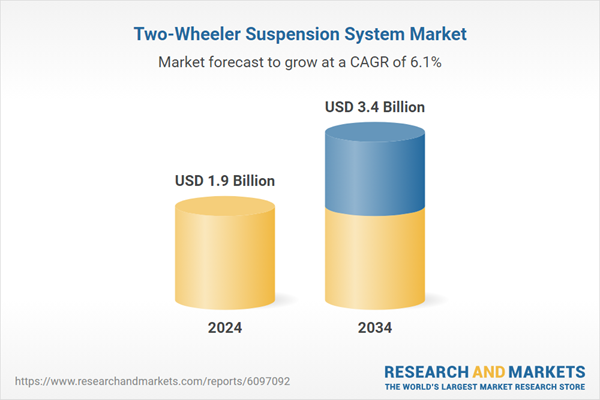The evolution of rear and front suspension technologies-especially the shift toward advanced mono-shock setups, lightweight materials, and electronically controlled systems-helps shape the market. Consumers are becoming more selective, demanding systems that offer better ride dynamics, particularly on poorly maintained roads. As demand grows for mid-range and commuter two-wheelers with refined suspension components, companies are shifting their focus to provide more adaptable solutions. Intelligent suspensions that adjust automatically to terrain or speed are emerging as performance-enhancing features that appeal to safety-conscious users.
Front and rear suspension systems continue to play a crucial role in enhancing the overall riding experience, with rear suspension units taking a significant lead in the market. In 2024, the rear suspension segment generated USD 1 billion, with projections indicating that this value will reach USD 1.6 billion by 2034. This growth is attributed to the vital function these units serve in absorbing road shocks, ensuring rider comfort, and improving vehicle stability, especially in regions with underdeveloped infrastructure. In less-developed urban and semi-urban areas, where roads often face wear and tear, rear suspension systems are essential for reducing the impact of rough surfaces on the overall ride quality.
The Motorcycles segment in the two-wheeler suspension system market held 67% share in 2024. This segment is expected to maintain its leadership, thanks to manufacturers increasingly integrating mono-shock rear suspension into mid-segment models. These systems, once reserved for high-performance bikes, are now featured in daily-use motorcycles to improve handling, cornering, and road comfort. The emphasis on performance, fuel efficiency, and affordability has pushed OEMs to recalibrate shock absorber systems for everyday commuters navigating rugged terrains.
Asia-Pacific Two-Wheeler Suspension System Market held 50% share in 2024, with China leading the way. The large population of two-wheeler users in China, paired with heavy urban congestion, has driven the demand for high-performance suspension systems. As urban traffic increases, two-wheelers have become an essential mode of personal transportation due to their affordability and maneuverability. The growing middle class, which is seeking cost-effective mobility solutions, has further contributed to the increased demand for reliable suspension systems. In this context, suspension systems are critical not just for safety but also for offering a comfortable and stable ride, making them a key feature in two-wheeler design and manufacturing.
Leading market players like KYB, Endurance Technologies, Showa, Gabriel India, WP Suspension, Mando, Tenneco, Fox Factory, BITUBO, and Chongqing Chuandong Shock Absorber are advancing their market positions through focused R&D investments, strategic collaborations, and new product rollouts. These companies refine their product lines to offer enhanced suspension performance for various motorcycle classes. Many are prioritizing lightweight, durable materials and electronically adaptive solutions. Partnerships with OEMs and aftermarket suppliers allow firms to strengthen their distribution channels, while global expansion strategies and technological differentiation help them remain competitive in an evolving mobility landscape.
Comprehensive Market Analysis and Forecast
- Industry trends, key growth drivers, challenges, future opportunities, and regulatory landscape
- Competitive landscape with Porter’s Five Forces and PESTEL analysis
- Market size, segmentation, and regional forecasts
- In-depth company profiles, business strategies, financial insights, and SWOT analysis
This product will be delivered within 2-4 business days.
Table of Contents
Companies Mentioned
The companies featured in this Two-Wheeler Suspension System market report include:- BITUBO
- Chongqing Chuandong Shock Absorber
- Duro Shox
- Endurance Technologies
- Fox Factory
- Fras-le
- Gabriel
- Hagon Shocks
- JRi Shocks
- K-Tech Suspension
- KYB
- Mando
- Matris Dampers
- Norton Motorcycle
- Penske Racing Shocks
- Showa
- Tenneco
- Touratech
- WP Suspension
- ZF Friedrichshafen
Table Information
| Report Attribute | Details |
|---|---|
| No. of Pages | 180 |
| Published | May 2025 |
| Forecast Period | 2024 - 2034 |
| Estimated Market Value ( USD | $ 1.9 Billion |
| Forecasted Market Value ( USD | $ 3.4 Billion |
| Compound Annual Growth Rate | 6.1% |
| Regions Covered | Global |
| No. of Companies Mentioned | 21 |









